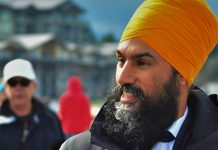
PMO photo

Photo by Chandra Bodalia

Photo by Chandra Bodalia
BC: NDP – 38%, Conservatives – 27%, Liberals – 29%
IN a random sampling of public opinion taken by the Forum Poll among 1392 Canadian voters, just more than one third will vote NDP in the coming federal election (34%), while just more than a quarter will vote Conservative (28%) or Liberal (27%). Few will vote Green (4%) or Bloc Quebecois (6%) or for anyone else (1%).
These findings stand in contrast to last week, immediately after the election was called, when as many as 4-in-10 were prepared to vote NDP (39%) and just one quarter were voting Liberal (25%). The Conservative vote has not changed since then (August 2 – 28%).
If these results are projected up to the new 338-seat House of Commons, the NDP would take 125 seats to 120 seats for the Conservatives. The Liberals would capture 89 seats, the Bloc would seat 3 members and the Greens would retain their single seat.
NDP Leader Tom Mulcair at 28% has a slight lead as to who would make the best Prime Minister as compared to 25% for Conservative Leader Stephen Harper and 23% for Liberal Leader Justin Trudeau.
NDP lead in BC, Quebec, tied in Ontario
* The three main parties are at parity in battleground Ontario; NDP – 33%, Conservatives and Liberals – 31% each.
* The NDP leads in Quebec (37%), outstripping the Liberals (22%) and the Bloc (21%).
* In the Liberal fortress of Atlantic Canada, the Liberals lead (41%), while the NDP (28%) and the Conservatives (25%) are tied.
* In the prairies, the Conservatives lead (43%) and the Liberals (27%) and NDP (26%) are tied for second.
* In Alberta, the Conservatives are dominant (44%), and the NDP are a distant second (32%).
* In BC, the NDP lead (38%) and the Conservatives (27%) and Liberals (29%) are tied in second.
Gender gap persists for Conservatives
While one third of males will vote Conservative (33%), fewer than a quarter of females will do so (23%). In the case of the Liberals, the gap goes the other way (24% males, 31% females). The NDP has an even gender distribution (33% and 34%, respectively). The oldest are especially likely to vote Liberal (65+ – 34%).
3-in-10 past Liberals will vote NDP
Three-in-10 voters who picked the Liberals in 2011 will vote for the NDP this time (30%), while one fifth of past NDP voters will opt for the Liberals (19%). About one tenth of past Conservatives will vote either Liberal (12%) or NDP (11%).
New Democrats least committed voters
While 7-in-10 Conservative voters are strong supporters of their party (70%), and 6-in-10 Liberals are as well (61%), just more than one half of New Democrats are strong supporters (54%).
Conservatives, NDP equally likely to win – voters
Expectations of victory are tied for the NDP and the Conservatives (30% each), while the Liberals trail (22%). Conservatives are most convinced of their party’s eventual victory (81%), while New Democrats (66%) and Liberals (60%) are less sure. One sixth of Liberals think either the Conservatives (14%) or NDP (15%) will win, while about 1-in-10 New Democrats think either the Conservatives (12%) or Liberals (11%) will win.
Harper and Mulcair tied for economy
Stephen Harper is tied with Tom Mulcair (30% to 29%) for who could handle the economy best, and Justin Trudeau lags slightly (26%).
Harper is clearly preferred for national security (35%) to Mulcair (26%) or Trudeau (21%), and he is also preferred for foreign affairs (31%), while Mulcair (26%) and Trudeau are tied (27%).
Tom Mulcair is clearly seen to be the best for handling the environment (36%), trailed by Trudeau (25%) and, distantly, by Harper (15%).
“It appears last week’s bump for the NDP wasn’t just giddy exhilaration brought on by the election call. People have had more than a week to absorb this campaign, to watch the candidates and fill up on the media, and they’re sticking with the progressive alternative. Among the signs this isn’t temporary are that Tom Mulcair is equally likely to be seen as the best steward of the economy as the Prime Minister, who has always owned that measure himself,” said Forum Research President Dr. Lorne Bozinoff.












